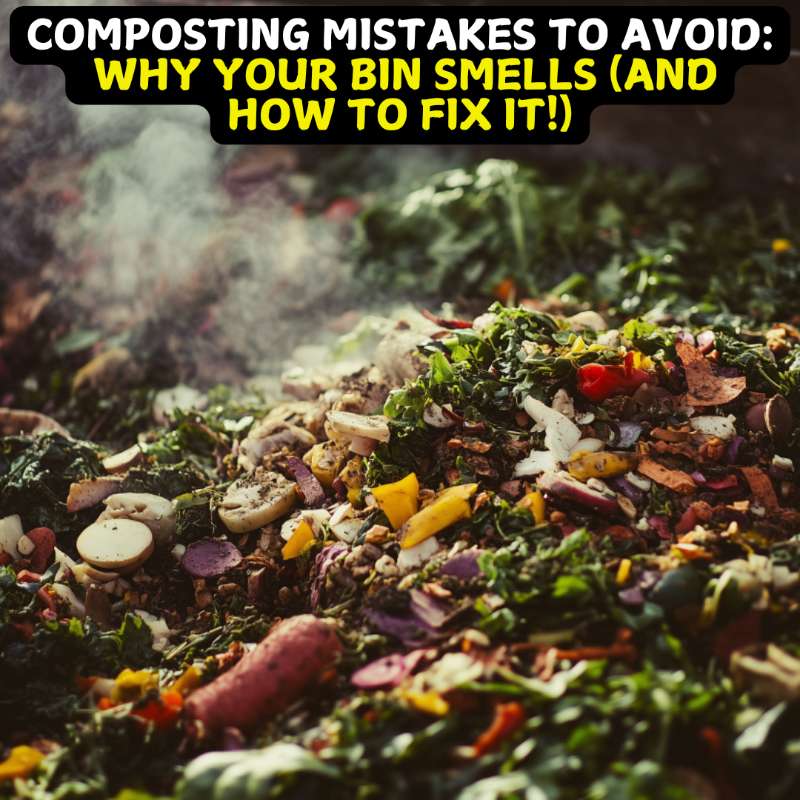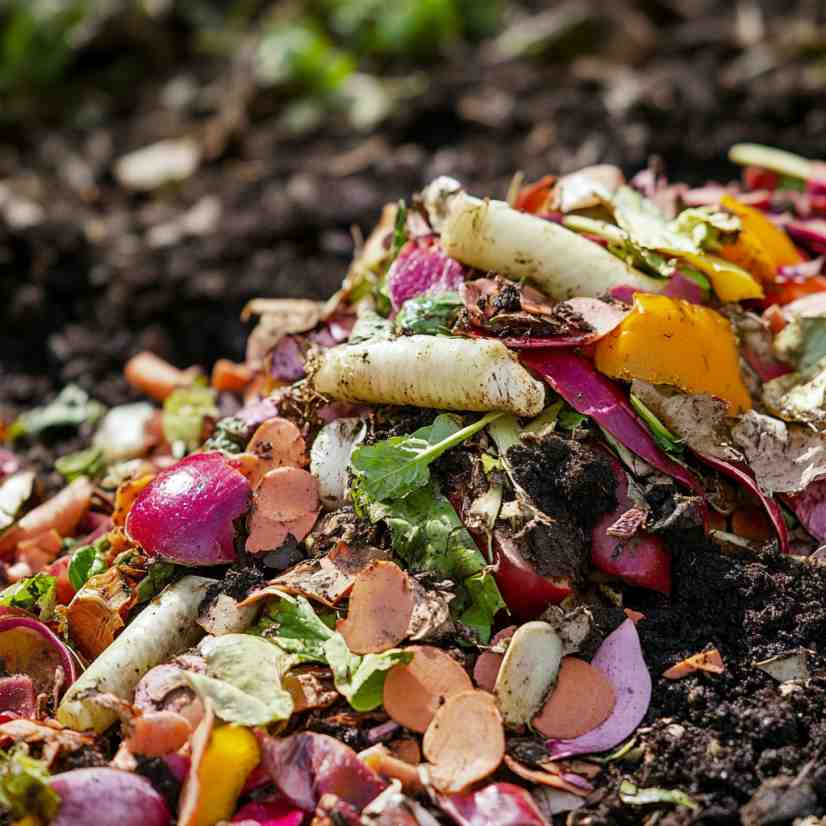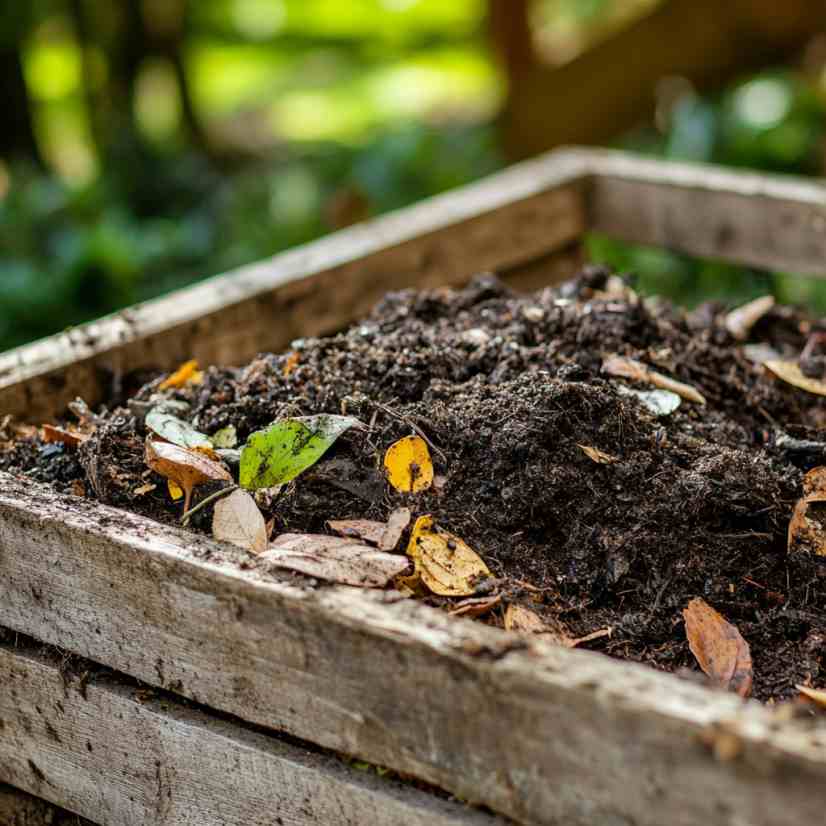🚫 Composting Mistakes to Avoid: Why Your Bin Smells (And How to Fix It!)

Make sure to like Living Green and Frugally on Facebook, Shop at Amazon to help support my site and explore our PINTEREST BOARDS for innovative ways you can become self-sufficient.
Composting is an amazing way to turn food scraps into nutrient-rich soil, but if your bin smells like a rotting dumpster, something’s gone wrong! 😷 Don’t worry—you’re not alone. Many beginners (and even seasoned composters) run into common mistakes that cause bad odors, slow decomposition, or attract pests.
In this guide, we’ll uncover why your compost stinks, what mistakes to avoid, and how to fix them so you can create a thriving compost pile that benefits your garden and the environment. 🌱✨
🤔 Why Does Compost Smell Bad?
A healthy compost bin should have an earthy, natural scent—like fresh soil after rain. If your compost smells like rotten eggs, ammonia, or garbage, something is off balance. The main culprits include:
🔹 Too Much Moisture – A soggy pile creates an anaerobic (low-oxygen) environment, leading to foul odors.
🔹 Lack of Airflow – Decomposition slows without enough oxygen, allowing bacteria to produce smelly gases.
🔹 Too Many “Greens” – Excess food scraps without enough dry materials cause rapid rotting.
🔹 Adding the Wrong Items – Dairy, meat, and oily foods can spoil and create nasty odors.
Now, let’s dive into the most common composting mistakes and how to fix them! 🛠️
❌ 7 Common Composting Mistakes (And How to Fix Them!)
1. Adding Too Many Food Scraps (Not Enough “Browns”)
Mistake: You keep tossing in fruit peels, veggie scraps, and coffee grounds, but forget about dry materials.
Fix: Balance is key! Use a 2:1 ratio of browns to greens. For every bucket of food waste, add two buckets of dry leaves, shredded paper, or cardboard. 🍂
2. Compost is Too Wet (Smells Like Rotting Garbage)
Mistake: Your compost pile is too soggy, creating an anaerobic environment that produces bad odors.
Fix: Mix in more dry materials like leaves, sawdust, or straw to absorb moisture. Also, turn your pile regularly to improve airflow. 💨

3. Compost is Too Dry (Nothing is Decomposing!)
Mistake: The pile is dry and crumbly, meaning microbes can’t break it down efficiently.
Fix: Sprinkle water on dry compost and mix it up. Your compost should feel like a wrung-out sponge—moist, but not soaking wet. 💦
4. Not Turning the Compost Enough
Mistake: You let the pile sit untouched, leading to uneven decomposition and bad smells.
Fix: Turn your compost once a week to aerate it and speed up decomposition. This prevents foul odors and keeps microbes happy! 🔄
5. Adding Meat, Dairy, or Oily Foods
Mistake: You throw in cheese, meat, and greasy leftovers, which attract pests and cause a rancid smell.
Fix: Stick to plant-based scraps! Avoid animal products and opt for vegetable peels, eggshells, coffee grounds, and bread instead. 🍞❌
6. Compost Pile is Too Small
Mistake: A tiny pile doesn’t generate enough heat for proper decomposition.
Fix: Aim for at least 3 feet by 3 feet (1 cubic yard) for the best results. Larger piles retain heat better and decompose faster. 🔥
7. Not Covering Your Compost (Attracting Pests)
Mistake: You leave food scraps exposed, inviting rodents, flies, and raccoons.
Fix: Bury food scraps under a layer of brown materials like leaves or grass clippings. A lid or compost cover also helps! 🦝

🏡 Pro Tips for a Healthy, Smell-Free Compost
✔️ Keep a Balance – Maintain the right mix of greens (food scraps) and browns (dry materials).
✔️ Chop Large Pieces – Smaller scraps decompose faster, so cut up veggies and cardboard.
✔️ Monitor Moisture Levels – Add water if too dry, or more browns if too wet.
✔️ Use a Compost Thermometer – The ideal temperature is 135-160°F for hot composting.
✔️ Turn Weekly – This keeps airflow steady and speeds up the breakdown process.
❓ Common Questions About Composting
Q: How long does composting take?
A: It depends on the method! Hot composting takes 2-3 months, while traditional composting can take 6 months to a year.
Q: Can I compost citrus peels and onion skins?
A: Yes! Some people worry they’re too acidic, but in small amounts, they break down just fine. 🍊🧅
Q: What should I do if my compost smells like ammonia?
A: Too much nitrogen (greens) is the culprit! Add more carbon-rich browns like shredded paper or straw to neutralize the smell.
Q: Can I compost in winter?
A: Absolutely! Decomposition slows down in cold weather, but insulating your pile with leaves or straw can help retain heat. ❄️🔥
🌍 Keep Composting, Keep Growing!
Composting is an easy, eco-friendly way to reduce waste and enrich your garden, but it takes a little know-how to get it right. By avoiding these common mistakes, you’ll keep your bin odor-free, pest-free, and working efficiently! 🌱💚
💬 Have a composting question or tip? Drop it in the comments below! 📝👇